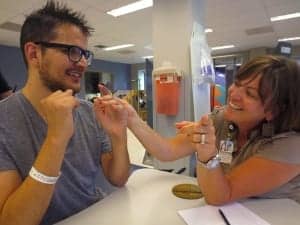
Nancy Chiaravalloti, PhD, director of TBI and Neuropsychology & Neuroscience Research at Kessler Foundation, articulates the organization’s excitement in using the funding to, “expand our knowledge of how the brain functions after brain injury and developing treatments that improve the function of individuals with TBI. Aerobic exercise, if proven effective, is cost-effective, natural, and readily available, so individuals have control of their rehabilitation.”
Kessler Foundation reports that Jeanne Lengenfelder, PhD, assistant director of Neuropsychology Research, received $397, 941 for 3 years to fund the evaluation of impaired emotional processing in individuals with TBI using a variety of neuroimaging techniques. The neuroimaging techniques include diffusion tensor imaging (DTI), functional magnetic resonance imaging (fMRI) at rest and fMRI during task performance. Using these techniques, Lengenfelder and Helen Genova, PhD, research scientist, co-investigator of the study, will reportedly evaluate the extent to which emotional processing deficits in TBI are due to abnormalities in structural and functional connectivity. The Foundation adds that brain scans at its newly opened Neuroimaging Center will show the damage to structures key to emotional processes and the impact on functional brain activation.
Victoria Leavitt, PhD, research scientist, received a $170,296 grant for 2 years. The grant will support the evaluation of aerobic exercise and its effect on the memory of TBI patients. According to a news release from Kessler, Leavitt and co-investigator James Sumowski, PhD, research scientist, collected pilot data in multiple sclerosis (MS) patients that indicated the efficacy of a 12-week program of aerobic exercise versus stretching to improve memory. The release notes that the primary goals behind the study are to improve memory and increase the volume of the hippocampus. Brain scans will also be taken prior to and after the aerobics treatment at the Neuroimaging Center at Kessler Foundation.
The Neuroimaging Center, which opened in May 2013, is designed to accelerate research advances, collect objective data and increase national and international collaborations.
For more information, visit KesslerFoundation.org
Source: Kessler Foundation





